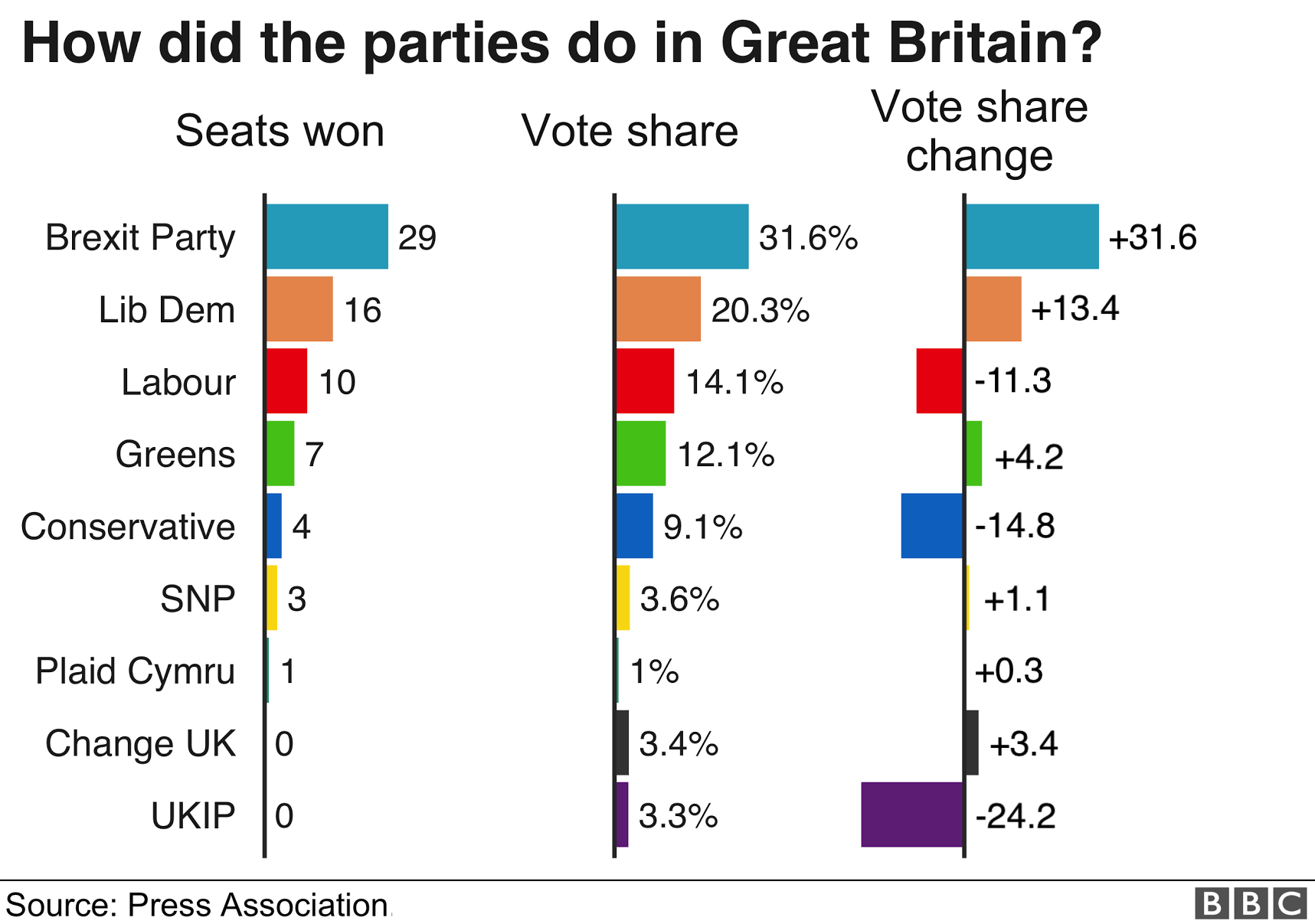From the BBC:

Leavers: Brexit Party got far and away the most votes and seats, so we won.
Remainers: Ah, but if you add the votes of the hard remain parties (Lib Dems, Greens, SNP, Plaid Cymru and Change UK), we won.
[Let's skip the debate about whether votes for the Conservatives or Labour are proxy votes for Leave and Remain respectively, Lord Ashcroft's polls say that the number one reason that people voted for those parties was 'Because I always do.'
Leavers: Ah, but lots of people would have voted Lib Dem, Green etc anyway, regardless of their EU policies.
Remainers: So let's look at the swing. Total Hard Leave (Brexit Party/UKIP) only up 7.4% compared to the 2014 elections, and the total vote share of Hard Remain parties (list as above) up by 22.4%. The net shift from Conservative/Labour to Hard Leave was 7.4% and from those two to Hard Remain was 22.4%. [Yes, those shifts add up to 29.8% and BBC give combined losses for Lab/Con as 26.1%, not sure where the other 3.7% came from]. That's a significant swing to Hard Remain.
Leavers: Hang on, weren't you moaning after the Referendum that with a 52%/48% result on a 72% turnout, strictly speaking only 37% voted to Leave and 63% didn't. This this time Hard Remain got 40% on a laughably low turnout of 37%, that means only 15% voted to Remain, which is a lot less than 37%.
Remainers: So why are you lauding Brexit Party's votes; they got 32% of 37%, that's only 14$%, hardly a mandate for a No Deal Brexit. Of 17.4 million people who voted Leave back in 2016, only 5.2 million voted Brexit Party, clearly 12 million of them have lost interest.
[And so on, ad infinitum].
Divide and Rule
4 hours ago



9 comments:
Having an idle hour, I once analysed all the votes cast for and against the various parties in all the elections from 1900 to 1974 ( I was having an argument with someone in 1976) .If I remember correctly, in every case except the Naional Government in the 1930s,no government has ever had a majority of votes cast.It is individual numbers that count, not overall, in other words, Bums on seats.
In England and Wales, the principal gaps in Brexit support were London and the M11/M40 corridors towards Oxford and Cambridge.
Scottish support for the SNP can be diagnosed as opposition to chronic mismanagement from Westminster. Both indicate the failure of regional economic policies, due to a failure to appreciate Ricardian economic principles.
If an independent Scotland was in the EU, they would soon find it was a mistake, as the costs of everything went up due to EU tariffs and higher transport costs. Shopping in Newcastle and Carlisle would flourish, though, at the expense of Edinburgh and Glasgow. The tailbacks on the A1 and M6 would be horrendous, though - the queue on the A1 would stretch from Berwick to Alnwick.
JD, that's what we suspected. How did you find this out, back in 1976?
Ph, yes, agreed. But that wasn't the point of this post.
JD, but what about the lab con coalition governments of the 1930s and 1940s? Their MPs must surely received a majority of votes cast?
I'm not getting too excited about it. UKIP often did well in European elections (for example, 2004) but couldn't translate this into General Election success. Euro-sceptics see the European Elections as as a way of registering a protest vote.
RT, exactly. Farage is setting himself up for a fall.
In 2014 there was no remainer vote option as it was not an issue then, and so change in vote for those parties is not a show of a change in sentiment, there was a leaver vote option in 2014 vote and that vote number went up in 2019.
Also turnout was only up by 2%.
Din, I beg to differ. Such a massive shift from lab/con to hard remain (and smaller shift to hard leave) is largely down to 'change in sentimemt'.
There can not be an indication for a change of sentiment since 2014 for a distinct policy of remain, because that differentiation did not exist in 2014.
Post a Comment